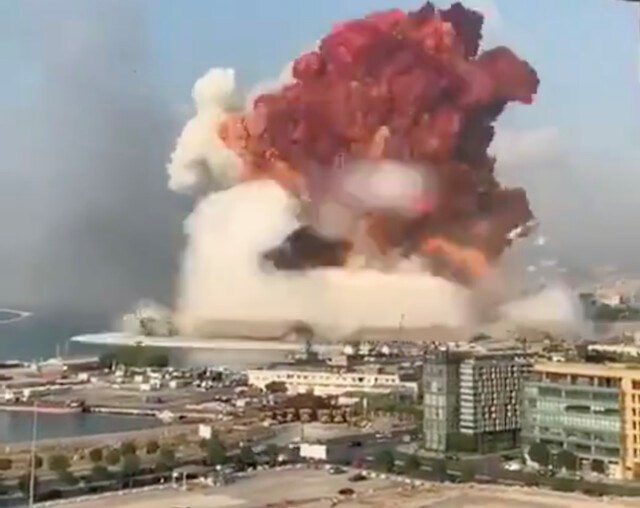Newmarket resident Wasim Jarrah was devastated and extremely worried about his many family members and friends in Lebanon after the massive explosion at a busy downtown port in Beirut this week.
“It’s actually devastating,” said Jarrah, a local realtor and active community volunteer who immediately began contacting loved ones who live and work in Beirut and in the nearby Beqaa Valley.
“The amount of destruction that this has done has not been seen before in main Beirut,” Jarrah said. “The odd thing that I found about this is that it is unlike anything we’ve seen before, like a civil war, Israeli war, Syrian occupation, or Palestian factions fighting in Lebanon.”
Thankfully, none of Jarrah’s family or friends were physically injured in the Tuesday, Aug. 4 blast, which has so far killed 137 people, injured at least 5,000, with others still missing, according to media reports. Jarrah said those he's been in touch with have suffered property damage, and are in emotional distress.
His uncle, a former minister in the Lebanese government who lives close to the port, said he was at home at the time of the blast early Tuesday evening and was shaken up physically by it. Jarrah's friend, who lives within 100 metres of the site, was ejected from his sofa and hit a wall.
“That’s how bad it was,” said Jarrah. “Another cousin who is a local doctor told me yesterday that he went out for a walk and he came back because he was so traumatized that something else would happen and he didn’t want to be on the road. Everyone is traumatized, a lot of people have lost their lives.”
According to media reports, Lebanon's President Michel Aoun said the explosion was caused by 2,750 tonnes of ammonium nitrate that was improperly stored at a warehouse at the port.
Ammonium nitrate is a chemical compound widely used as fertilizer by farmers, and as an explosive in the mining industry.
The Lebanese government said on Wednesday it has placed several port officials under house arrest while it investigates the blast, and vows that those responsible will face the “maximum punishment”.
Jarrah said the first thing that went through his mind on Tuesday was that “here we go. ...Oh my God, here’s the war that we’ve been waiting for because the country, in itself, is so tense right now”.
“The whole geo-political area there, whether it’s Syria, Iran, Iraq, Yemen, is exploding right now,” he said.
In a first-person account of the days following the devastating explosion, BBC News journalist Quentin Sommerville describes Beirut, the city in which he’s lived for five years, as “almost unrecognizable. ...It's a city of sirens, of empty buildings, of empty streets”.
“As I look at the neighbourhood of Gemmayze just behind the port, I don't think I can see a single pane of glass left. Entire roofs have gone. I can see friends' apartments which are just open to the sky now. All of this area, which was really heavily populated, has been abandoned. No one is coming back here anytime soon,” Sommerville said in an Aug. 6 article published on the BBC News website.
“What's really noticeable as you walk the streets here is that every second person seems to have a broom in their hand,” said Sommerville. “There are clear-up teams everywhere, but it's pretty low tech: tiny teams of people with pans and brushes to clean up an entire city's devastation.”
Jarrah said that a lot of people had already left their jobs in Beirut’s downtown business district at the time of the blast, and he is deeply saddened that some people are still missing and families are searching for their loved ones.
“One of the things that got me yesterday and I started crying, was a mother who had gone into a hospital looking for her son. She was saying he’s the apple of my eye and the love of my heart, and the doctor knew that he was dead. He said he hasn’t seen him yet, he didn’t have the heart to tell her,” said Jarrah.
The Newmarket father of two takes aim at the Lebanese government, which he said has been “devastated with corruption, a currency that’s lost 60 per cent of its value, and electricity in Beirut that comes less than six hours a day”.
Now, the destruction of the port that is the main entry of products such as food has been affected. Jarrah said it’s important to get food, supplies, and aid directly into the hands of the Lebanese people.
“The good thing about Lebanon is it’s a country that everyone loves, except its own leaders,” said Jarrah, adding that Canada and other countries have already committed financial aid. “But, unfortunately, the (Lebanese) government and the president, right now, works for foreign agendas and not the Lebanese people.”
“What government for six years would know that ammonium nitrate is stored unsafely in an area on the port and not do something about it?” he said. “I’m confident that things could change, but you’ve got everything going bad for Lebanon, you’ve got COVID, the economy, health care, everything is going bad, and now this awful, awful, destruction of lives and property.”
You can donate to the Canadian Red Cross Lebanon humanitarian needs appeal here.


